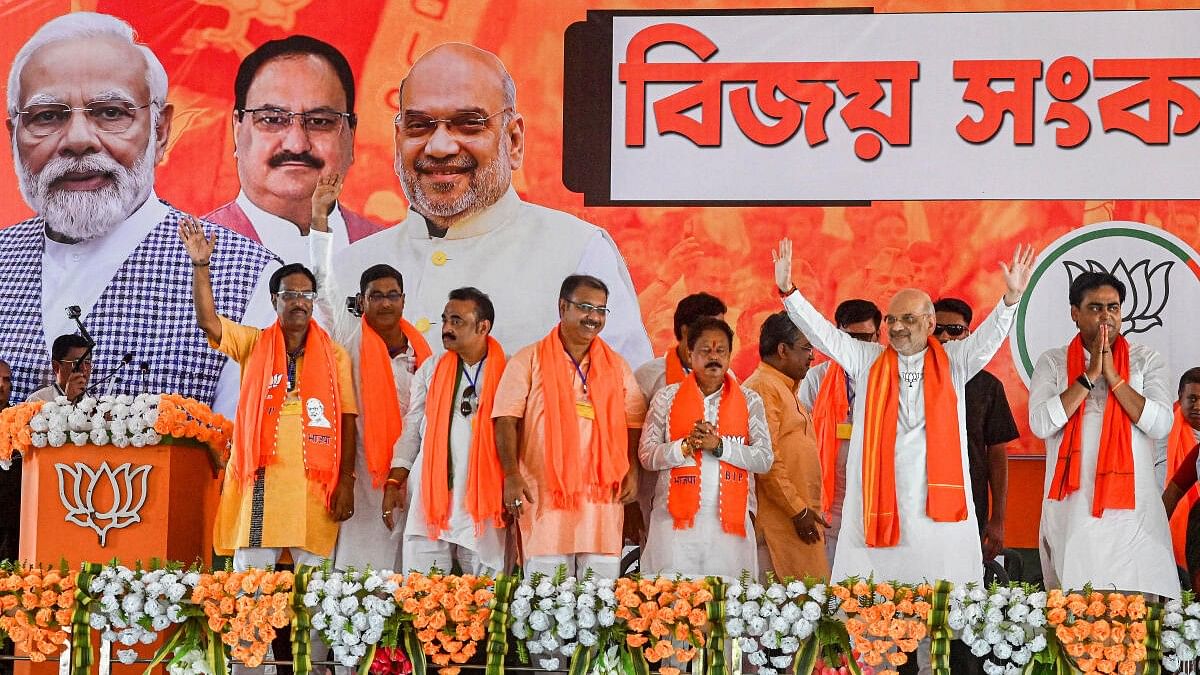
Union Home Minister and BJP leader Amit Shah during a public meeting for Lok Sabha elections, at Bangaon in North 24 Parganas district.
Credit: PTI Photo
With the glacial progression of the general elections, pre-poll certitudes are giving way to a more nuanced picture. Not many will now say that it’s going to be a romp for the Bharatiya Janata Party (BJP).
The primary reason being cited for the opening of the field is the lack of an overarching national issue, which brings into play regional considerations. This lends greater salience to local identitarian equations, and makes for the materiality of materialities like livelihoods, economic sustenance, galloping inequality, and social infrastructures.
In turn, these seem to have restricted the space available for ‘charismatic politics’. Prime Minister Narendra Modi’s presidential style and plebiscitary appeal are not cutting it.
It has become painfully apparent that Modi and his BJP have very little to say about his regime’s performance because it has presided over a lost decade at the end of which deprivation and distress haunt two-thirds of India’s population going by the 2011 count, just over 1.2 billion, and the number of people being provided with emergency food aid, just over 800 million.
This has caused Modi and other top BJP leaders to pivot hard to communal falsehoods while electioneering. Thus, not only is the campaign now blatantly divisive and violative of the Model Code of Conduct — though the Election Commission of India turns a deaf ear to even the most gross and egregious communal vituperations — it is also full of vile slanders and outright lies. Modi and his partymen are in default mode.
Sample these. After the infamous misrepresentations of the Congress’ manifesto, especially the ‘mangalsutra’ remark on April 22, in Banswara, Rajasthan, Modi claimed, while campaigning in Maharashtra on May 15, that the Congress government led by Manmohan Singh had planned to use 15 per cent of the Union Budget separately for Muslims, but had been prevented from doing so by him when he was the chief minister of Gujarat. The Congress, he said, was planning to resuscitate this plan.
Modi squeezed minority-bashing and inveterate untruthfulness into one despicable package. While he was grandstanding in Maharashtra, Union Home Minister Amit Shah was in West Bengal peddling his version of division and falsehood.
Riffing on the Trinamool Congress (TMC) slogan ‘Ma, Mati, Manush’ (Mother, Land, People), he said West Bengal’s ruling party was all about ‘Mullah, Madrasa, Mafia’, leaving little scope for listeners to miss the tarring by association. Substantively, Shah’s grouse was that the TMC circumvented a Calcutta High Court order outlawing gratuities to ‘Mullahs’ by rerouting them through the Waqf Board.
Everything about Shah’s plaint failed the whole-truth test. The facts are that the court stopped direct stipends to imams and muezzins in September 2013. It is true that the government then made the payments through the Waqf Board — legally. It is also true that similar payments are made to priests of Hindu temples.
Shah was on a fabrication spree. He accused Chief Minister Mamata Banerjee of not allowing the immersion of Durga idols and giving extra holidays during Ramzan. The truth is that Banerjee has instituted a 10-day holiday for Durga Puja and gives ₹70,000 annually to puja committees. Whether these competitive subsidies for religious practices are healthy or not is another point, though.
What is par for the course is that Modi and Shah continue to sow division. What is extraordinary, though, is that the speeches mentioned above were made within a day of Modi’s risible claim in an interview on May 14 that his comments about those who had more children had been misinterpreted and that he would never ‘do Hindu-Muslim’.
In West Bengal, however, Shah’s raising of the communal temperature is a direct consequence of the fact that it is under the cosh. Far from building on its 2019 success, it looks wobbly, for many reasons. First, its strategy of using the Sandeshkhali issue has unravelled, and could boomerang, with the emergence of sting videos that cast doubts on the allegations of sexual exploitation, coupled with several retractions by women who now say they were duped into making them.
Second, the BJP’s nominations and the dilatory way they were arrived at did not set off any fireworks, while their outsider-led campaign has stoked the old charges that it is an out-of-state party. The same things happened in the 2021 Assembly elections. We all know how that played out.
The change in mood nationwide is a matter of perception. But few are taking a BJP victory as an ineluctable conclusion anymore, come June 4.
(Suhit K Sen is author of ‘The Paradox of Populism: The Indira Gandhi Years, 1966-1977’.)
Disclaimer: The views expressed above are the author's own. They do not necessarily reflect the views of DH.